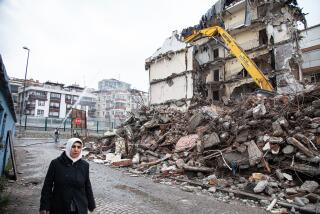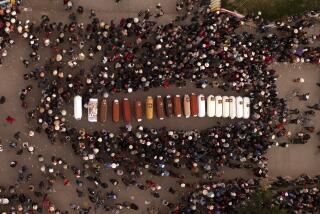Peru’s quake survivors condemn slow reconstruction
- Share via
CHINCHA ALTA, PERU — As hundreds of angry earthquake survivors blocked Peru’s main highway demanding new homes, many hailed Venezuelan President Hugo Chavez as a savior -- and condemned their own president, Alan Garcia.
The slow pace of the Peruvian government’s reconstruction efforts since the Aug. 15, 2007, quake killed more than 500 people and wrecked up to 75,000 houses has only highlighted Chavez’s relatively small contribution of 100 quake-proof plastic houses to Chincha Alta’s homeless.
All told, only 2,000 houses have been rebuilt in this town at the center of the quake zone, according to the international aid agency CARE.
“These houses Chavez built are a good example for Garcia,” said Jose Torres Pino at Saturday’s highway protest on the anniversary of the magnitude 8 quake. The units were completed three months after the temblor and distributed by lottery. The only criterion for entering was having lost a house in the quake, and Torres was a lucky winner.
Chavez’s shiny, three-bedroom units came furnished. Each cost $30,000 to build and all have clean, running water as well as access to a sewage system and a well-equipped park.
In its defense, Peru’s government says it is spending millions of dollars on rebuilding. But thousands of families still live in shelters of plastic, wood and cane, without running water or sewage facilities. Hospitals, schools and churches are damaged and clean water is in short supply.
In the stricken town of Pisco, about 20 miles south of Chincha Alta, more than 120 people died in church during the quake. Today the roads are still strewn with rubble, gaping houses are hidden by brick “walls of shame” that hide the damage, and crime levels are on the rise.
The winter weather is not helping.
“We are cold, the children are cold and sick, and we want a house,” said Luis Avalos Pasacher, a Chincha Alta taxi driver whose nephew died in the quake. “The dream is to have a house like this,” he said pointing at the Chavez project. “We get lots of promises from our government, but nothing happens.”
Asked whom they might vote for in the 2011 election, a group of Chincha women laughed and mentioned potential candidate Keiko Fujimori. She is the daughter of Alberto Fujimori, Peru’s former leader who was convicted in April of mass murder and kidnapping and sentenced to 25 years in prison.
Garcia, they said, has done nothing for them.
Back on the main Pan American highway through Chincha Alta, about 110 miles south of Lima, protesters on Saturday dragged boulders onto the road and put up a sign directed at gridlocked drivers. “We want our bonus,” it read.
They mean the $2,000 that the Peruvian government promised to those who lost houses in the disaster. A local activist group called Reconstruction Collective estimates fewer than 50% of those eligible have received the money. Others say the figure is closer to 30%.
The website of the government bank charged with distributing the bonuses says it has given 28,000 of them, but even those who received the funding said it did not go far in paying bills for healthcare, education, food, clothes, transportation and beds.
The government’s Reconstruction Fund for the South, or FORSUR, says it also distributed $150 million for reconstruction projects. Last week both Garcia and Peru’s housing minister blamed local authorities for the slow pace of reconstruction.
Speaking on national radio, Housing Minister Francis Allison described rebuilding as “impressively slow” and said FORSUR must use funds for housing, not just public works. “Big changes” would be coming soon, he vowed.
On Saturday, after police fired a few rounds of tear gas, protesters returned to their shacks and traffic flowed.
Felicita Gonzales de Fajardo, another Chavez house winner, lost her 12-year-old granddaughter Ambar the night of the quake. The young girl was hit by a falling wall.
Smiling, but with tears in her eyes, Gonzales said she wanted to send a “big hello” to Chavez and tell him that he was welcome in Chincha Alta.
“Without Chavez we would have nothing,” she said. “He saved us.”
--
Kevany is a special correspondent.
More to Read
Sign up for Essential California
The most important California stories and recommendations in your inbox every morning.
You may occasionally receive promotional content from the Los Angeles Times.










